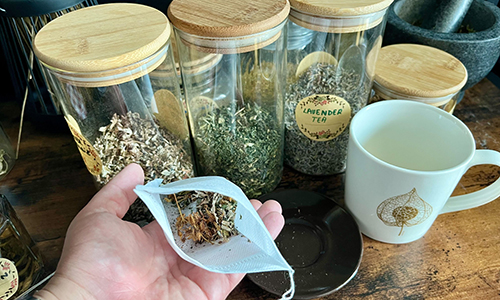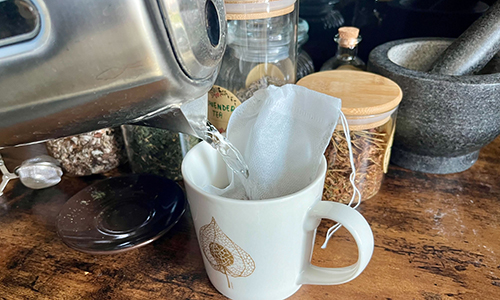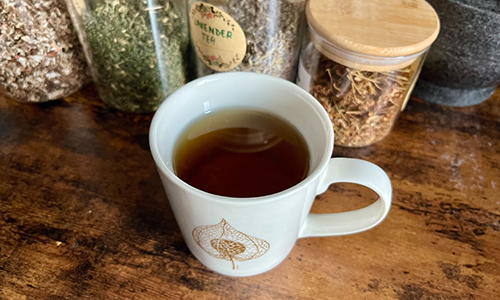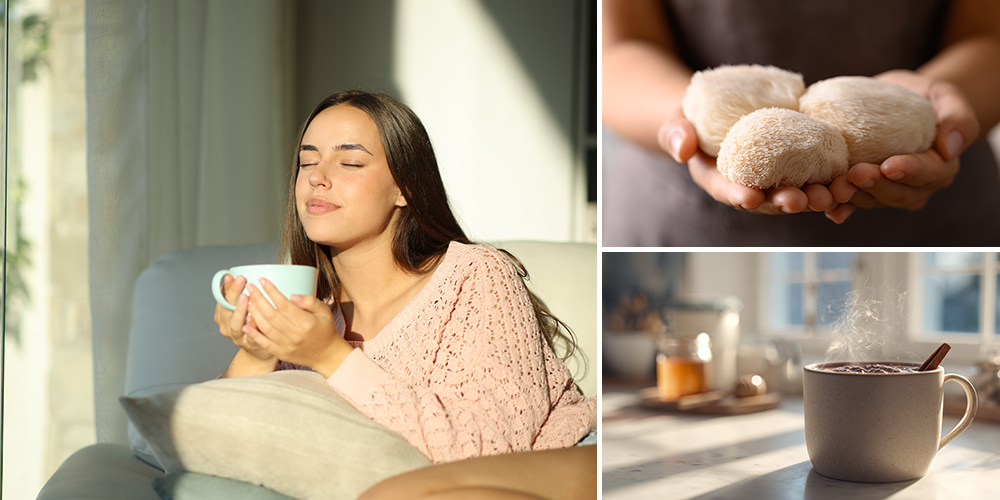
Is Your Body Trying To Warn You?
If you’ve recently endured several nights, days, or even weeks without sleep, you know the toll it can take. Rest is essential for your overall health and your general well-being. When you sleep your body rejuvenates and repairs cells in your body, builds bone and muscle, and strengthens your immune system. It also can help you process and consolidate memories, improve concentration, and regulate emotions. Getting adequate sleep has been linked to a lower risk of chronic diseases like heart disease, diabetes, and obesity. It can additionally help you feel rested and refreshed, improving your mood and productivity. The National Sleep Foundation highly recommends 7-9 hours of sleep. Here are some signs you are not getting the sleep you need!
Signs of Poor Sleep Quality
If you are not getting enough sleep, it can be easy to tell just by listening to your mind and body. I have struggled with sleeping a full night through and being able to get back to bed after waking up. The recipe in this article has tremendously improved my quality of sleep. Everyone is different and our bodies react differently. If you are on any other medications consult your doctor prior to trying this recipe.
Fatigue and grogginess
Waking up feeling tired, sluggish, and lacking energy is a clear indication that you’re not getting enough sleep.
Difficulty concentrating
Struggling to focus, pay attention, and make decisions can be a result of inadequate sleep.
Memory lapses
Forgetting important details, learning new information, or struggling to recall memories may indicate sleep deprivation.
Mood disturbances
Irritability, anxiety, depression, and mood swings can occur when you’re not getting sufficient sleep.
Physical symptoms
Headaches, muscle pain, and stomach problems can be linked to inadequate sleep.
Weakened immune system
Continuous sleep deprivation can weaken your immune system, making you more susceptible to illnesses.
Weight gain
Sleep affects hunger hormones, leading to increased appetite and potential weight gain when you’re not getting enough sleep.
Premature aging
Chronic sleep deprivation can lead to fine lines, wrinkles, and age spots due to the body’s inability to repair and regenerate cells. Repairing those cells is important for many reasons.
Increased risk of accidents
Drowsy driving and workplace accidents can occur when you’re not getting enough sleep.
Dark circles and puffiness
Lack of sleep can cause eye bags, dark circles, and puffiness due to poor circulation and fluid retention. According to the National Sleep Foundation, “Adults who sleep less than 7 hours per night are more likely to experience chronic diseases like obesity, diabetes, high blood pressure, heart disease, stroke, and mental health disorders” (National Sleep Foundation, n.d.). The American Academy of Sleep Medicine recommends that adults aim for 7-9 hours of sleep each night for optimal health and functioning (AASM, 2015).
What Can Help?
Sometimes you may just struggle to sleep through the night or struggle to fall asleep. This takes such a toll especially when it goes on for more than one night. This tea blend has tremendously helped me. I was having trouble falling and staying asleep, I tried melatonin, but the drowsiness was too tiring the next morning. This makes the perfect tasty warm drink before bed. Use Lemon Balm, Chamomile, Lavender, and Passionflower. It is calming and sets your mood to fall asleep and rest properly.
What I like most about the herbal remedies in this recipe, is that I am 100% sure Chamomile and Lavender are organic. I grew them myself! It didn’t take much time and this way I got them really cheap from here.
Medicinal Uses of The Ingredients
Lemon Balm
Studies have indicated that 95% of subjects responded to treatment with lemon balm, with 70% achieving full remission for anxiety and insomnia. Research from the National Institutes of Health (2010) highlights the effectiveness of lemon balm in reducing anxiety and improving sleep quality. The study showed significant improvements in anxiety, associated symptoms, and insomnia in those treated with lemon balm.
Chamomile
Chamomile tea is one of the most popular herbal teas for promoting sleep and relaxation. Studies have shown that chamomile can help reduce symptoms of generalized anxiety disorder and improve sleep quality. Regular consumption of chamomile tea has been linked to a significant reduction in the severity of insomnia.
Lavender
Like chamomile, lavender also has mild sedative properties. It can help improve the quality of sleep and the duration of deep sleep phases. Clinical studies suggest that inhaling lavender can improve sleep quality and duration, reduce the time it takes to fall asleep and increase slow-wave sleep, the deepest phase of sleep .
When I can’t sleep I use the Lavender Tincture I made myself using the instructions in this brochure that came along with the seeds.
Passionflower
Studies indicate that passionflower can significantly improve sleep quality and reduce sleep disturbances. It has been found effective in reducing the time to fall asleep and increasing overall sleep duration.
Combining chamomile, lavender, and passionflower can provide a comprehensive approach to improving sleep. Each herb contributes uniquely to reducing anxiety, promoting relaxation, and inducing sleep. Here’s how they complement each other:
- Chamomile soothes the digestive system and calms the mind.
- Lavender enhances relaxation through its aroma and mild sedative effects.
- Passionflower targets the nervous system, reducing anxiety and enhancing the calming effects of the other herbs.
These herbs together can create a potent and pleasant tea blend that supports a restful night’s sleep.
Serene Slumber Herbal Tea
Ingredients
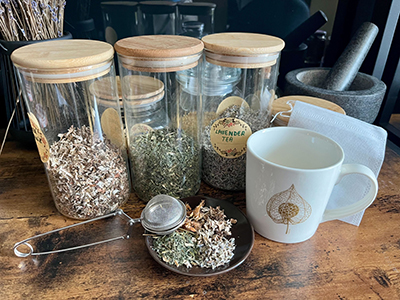
- 1 teaspoon dried Chamomile
- 1 teaspoon dried Lemon Balm
- 1/2 teaspoon dried Lavender
- 1 teaspoon dried Passionflower
- Sleep Blend Tincture (It boosts the production of GABA, a calming brain chemical that promotes sleep. It also assists in improving sleep issues connected with menopause – Optional)
How to make it
Always start with a clean workspace. Remember to have fun during the process. You can store your tea in the fridge for up to 3 days.
- Start off by bringing your water to a boil in a kettle, or small pot on the stove.
- If you choose to use a tea bag like me, place all the herbs inside and put them in the mug.

- Pour the boiling water and allow the tea to steep for 5-10 minutes. For a stronger flavor and more potent effects, let it steep for the full 10 minutes.

- Sweeten with honey if desired, or add a slice of lemon to enhance the flavor along with the tincture. (Optional)

Sip the tea slowly about 30 minutes to an hour before bedtime to help relax your mind and body, preparing you for a restful night’s sleep.

